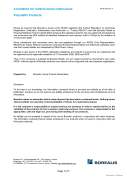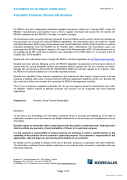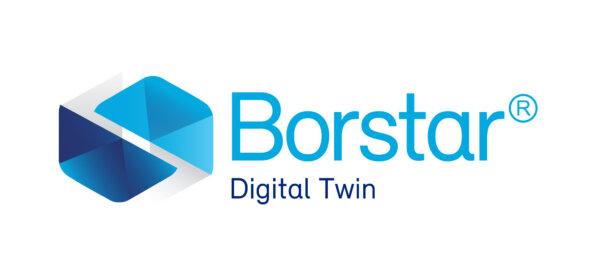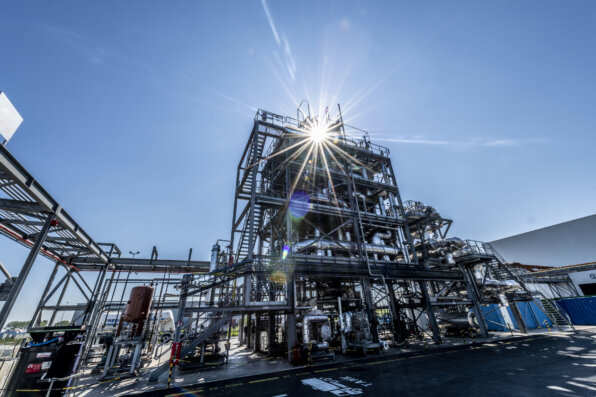Product Compliance
Ensuring full compliance with global regulations
Product Safety and Compliance are top priorities for Borealis. These concerns are handled by the Product Stewardship department across all products, from base chemicals , to virgin or recycled polyolefins.
EU Regulations REACH and CLP
Borealis is in full compliance with REACH and CLP.
REACH (Regulation (EC) No 1907/2006) is the European Union regulation on Registration, Evaluation, Authorization and Restriction of Chemicals. The aim of REACH is the safe use of chemicals to ensure a high level of protection for human health and the environment from the risks that can be posed by chemicals.
Borealis is committed to fulfilling its legal obligations and is in full compliance with REACH. In 2019, Borealis joined Cefic’s REACH Action Plan for Review / Improvement of Registration Dossiers and follows the therein agreed roadmap to review and upgrade all of its REACH registration dossiers by 2026.
CLP (Regulation (EC) No 1272/2008) is the European Union regulation on Classification, Labelling and Packaging of substances and mixtures. Borealis issues Safety Data Sheets (SDS) in compliance with CLP and REACH (Annex II) Regulations. For non-hazardous products, which do not require a SDS according to REACH Article 31, Borealis provides Product Safety Information Sheets (PSIS) containing relevant information on product safety according to Article 32 of REACH Regulation.
Downloads
-
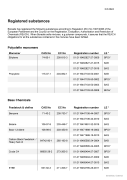
Registered Substances
pdf. 101kb .English -
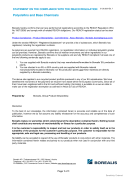
REACH Compliance Statement
General Statement (without restrictions).pdf. 74kb .English -
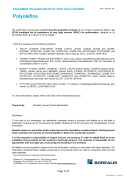
Borealis statement on SVHC in its polyolefin products
General Statement (without restrictions).pdf. 116kb .English -
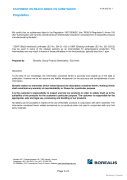
Borealis statement on Annex XIV substances regarding its polyolefin products
pdf. 118kb .English
Global Chemical Compliance
In recent years, several chemical legislation regimes have been developed in different parts of the world. Borealis keeps up with these emerging regulations and makes sure that its products are compliant with all legislation in the global markets it supplies.
GHS
The Globally Harmonised System of Classification and Labelling of Chemicals (GHS) managed by the United Nations includes criteria for the classification of health, physical and environmental hazards. The aim of the GHS is to harmonize classification and labelling standards around the world. More and more individual countries and regions are implementing GHS; the EU implementation is the CLP Regulation.
Global Conventions
Borealis is following and fully compliant with the international conventions concerning chemicals, such as the Stockholm or Rotterdam conventions.
Turkey REACH
Borealis is aware of the KKDIK (Kimyasalların Kaydı, Değerlendirilmesi, Izni ve Kısıtlanması hakkinda yönetmelik) regulation on registration, evaluation, permission and restriction of chemicals. Borealis Plastik ve Kimyasal Maddeler Ticaret Limited Şirketi, acting as the regulatory importer, has pre-registered all relevant substances. Borealis intends to ensure that its pre-registered substances will be fully registered by the applicable deadlines.
UK REACH
All relevant substances in Borealis products that were under active sale during the Brexit transition period were downstream user import notified (DUIN) by Borealis UK Ltd. Therefore, UK customers buying from Borealis UK Ltd. are downstream users under UK REACH. Full UK REACH registrations will be carried out according to a phased registration timeline based on the tonnage threshold limits and substance hazard characteristics.
South Korea REACH
All relevant substances contained in Borealis products that are sold to customers in South Korea have been pre-registered under K-REACH by its Only Representative. Ongoing registrations will be carried out in line with the tonnage dependent registration deadlines. Borealis’ basic polymers are polymers of low concern (PLC) and the company is therefore applying for PLC exemptions for them.
US TSCA
For Borealis’ US business, Group Product Stewardship supports the US legal entities to ensure compliance with all relevant sections of the Toxic Substance Control Act (TSCA).
Explosives Precursors Regulation (EU) 2019/1148
A process has been implemented to fulfil new requirements for regulated and restricted substances.
Downloads
Application Related Product Compliance
Borealis polyolefin products are used in a variety of end applications, each which have specific regulatory and safety requirements. The company supports its customers in fulfilling all of these obligations. The most highly-regulated areas are described in more detail below.
Food contact
- Food is essential for human life. In addition to the quality of food itself, the materials with which food comes into contact are increasingly becoming a focus of legislation around the globe. This comprises food packaging, as well as dishes and other kitchen tools and equipment in the food industry, such as conveyor belts, funnels etc.
- Borealis’ resins, as well as Borealis’ customer’s products, are sold globally, thus, they need to be compliant with applicable food contact legislation in many regions around the world. Compliance therefore needs to be regularly assessed and confirmed in a declaration of compliance (DOC); these are provided in Borealis’ food contact statements.
- Borealis food contact statements cover relevant legislation in areas with the most developed food contact legislation. Confirmations for additional areas are available on request (please contact your Borealis sales contact).
- Please note that “general food contact statements” as published for some Borealis products, are only intended for orientation purposes and do not replace a detailed DOC, which may be made available upon request.
Drinking water
In many countries, the regulations and standards on finished materials and articles intended to be used in contact with drinking water are subject to an assessment by competent authorities or accredited certifiers, which typically comprises an assessment of the raw material composition. For this purpose, Borealis provides detailed information on the composition of application-specific polyolefin grades upon request.
Healthcare
Borealis offers a dedicated grade range of Bormed™ polyolefin products to the healthcare market. These products fulfil the stringent regulatory requirements for medical devices, pharmaceutical and diagnostic packaging, including those set out in the Eur. and U.S. Pharmacopoeia, as well as undergoing ISO 10993 testing. For additional information, please consult Healthcare.
Post-consumer recyclates (PCR)
Transforming waste back into products creates additional regulatory challenges. In particular, recyclates derived from mechanically-recycled post-consumer waste require specialist processes and handling as their composition is not fully known. Borealis applies a testing program and risk assessment regime to enable compliance with the relevant chemicals legislation in this area.
Application-specific laws, regulations and standards
For application-specific laws, regulations and standards, such as packaging and packaging waste directive (PPW), end-of-life vehicles (ELV) or Restriction of Hazardous Substances (RoHS), as well as a list of non-intentionally added substances, please refer to the grade-specific ‘Statement on Chemicals, Regulations and Standards’. A guidance document explaining the contents of these chemical statements can be found here.
Feedstock and raw materials
Borealis uses a wide variety of different feedstocks for polyolefin and base chemical production. Borealis utilizes ISCC PLUS for tracking bio-based and circular raw materials. ISCC PLUS is a sustainability certification program for ensuring the traceability of bio-based and circular raw materials throughout the entire value chain. Details of ISCC PLUS-certified feedstocks and products can be found on the company’s Quality page. Please refer to the grade-specific ‘Statement on the origin of raw materials’ for the raw material origins of the additives used.
Downloads
-
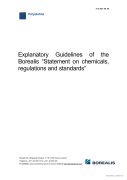
Explanatory guidelines of the 'Borealis Statement on chemicals, regulations and standards'
Guideline Document (without restrictions).pdf. 547kb .English -
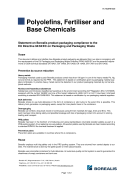
Borealis statement on product packaging compliance to the EU Directive 94/62/EC on Packaging and Packaging Waste
General Statement (without restrictions).pdf. 126kb .English -

REACH Compliance Statement
General Statement (without restrictions).pdf. 74kb .English -
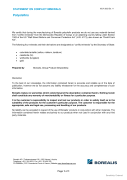
Statement on conflict minerals
General Statement (without restrictions).pdf. 77kb .English -

Borealis statement on SVHC in its polyolefin products
General Statement (without restrictions).pdf. 116kb .English
